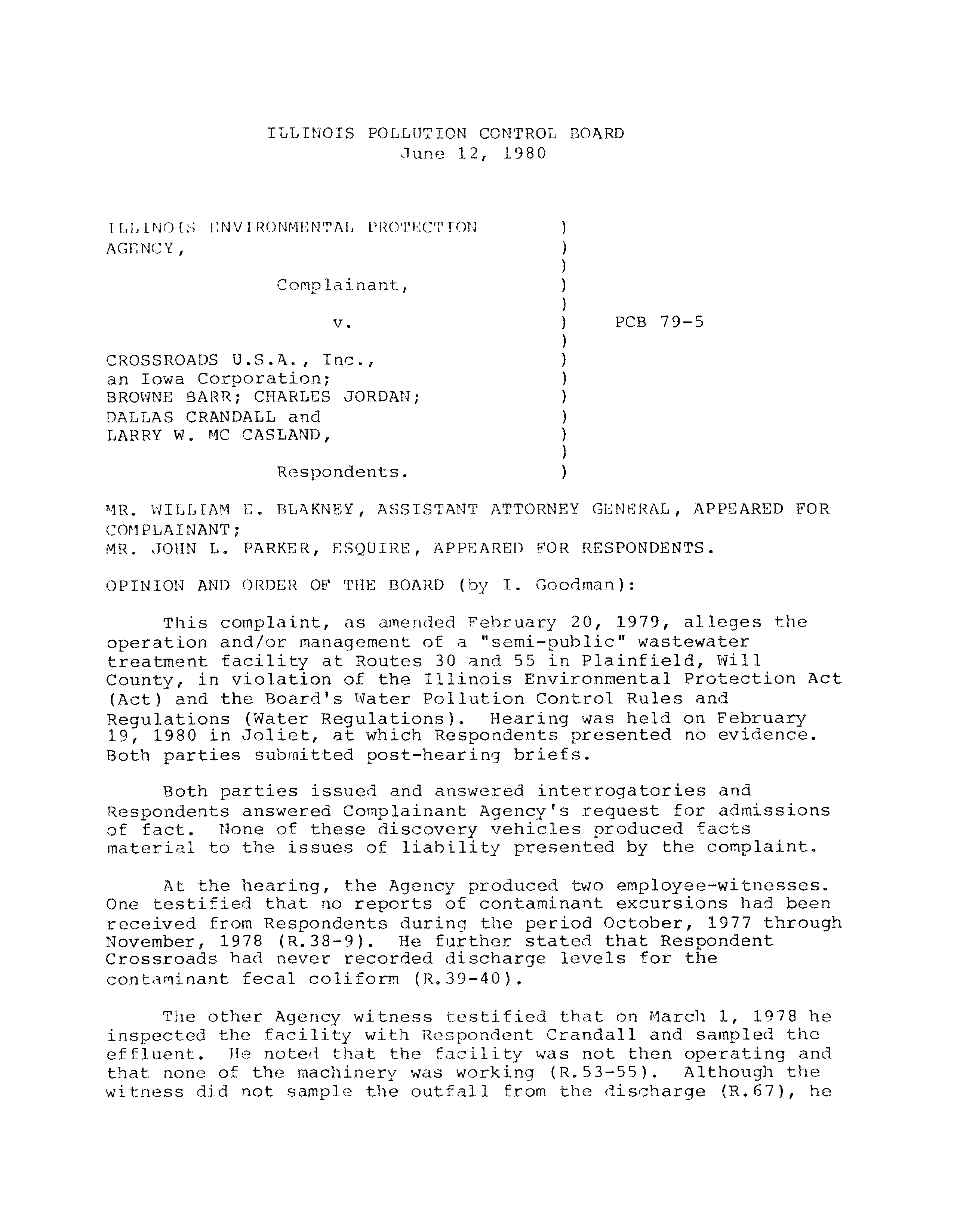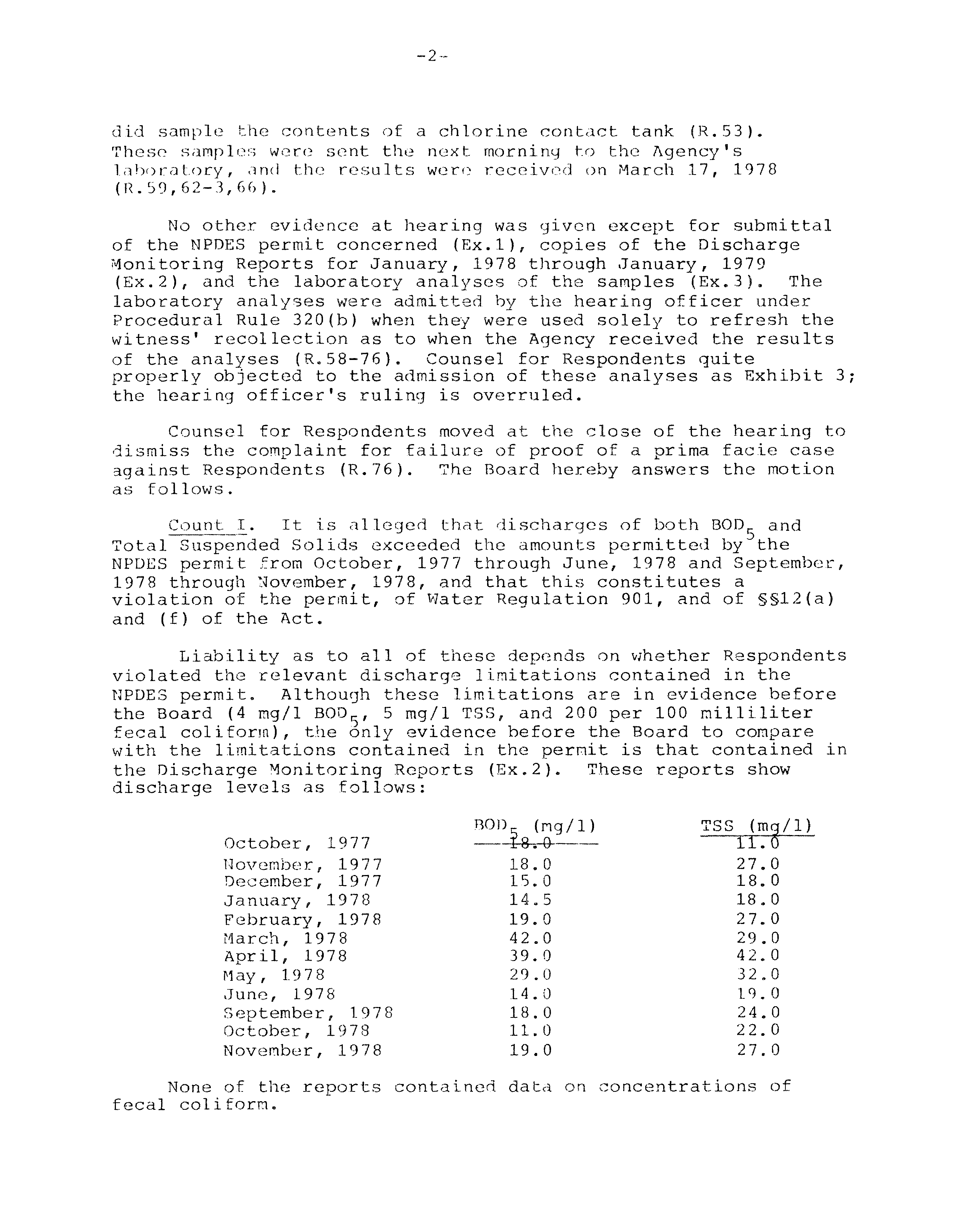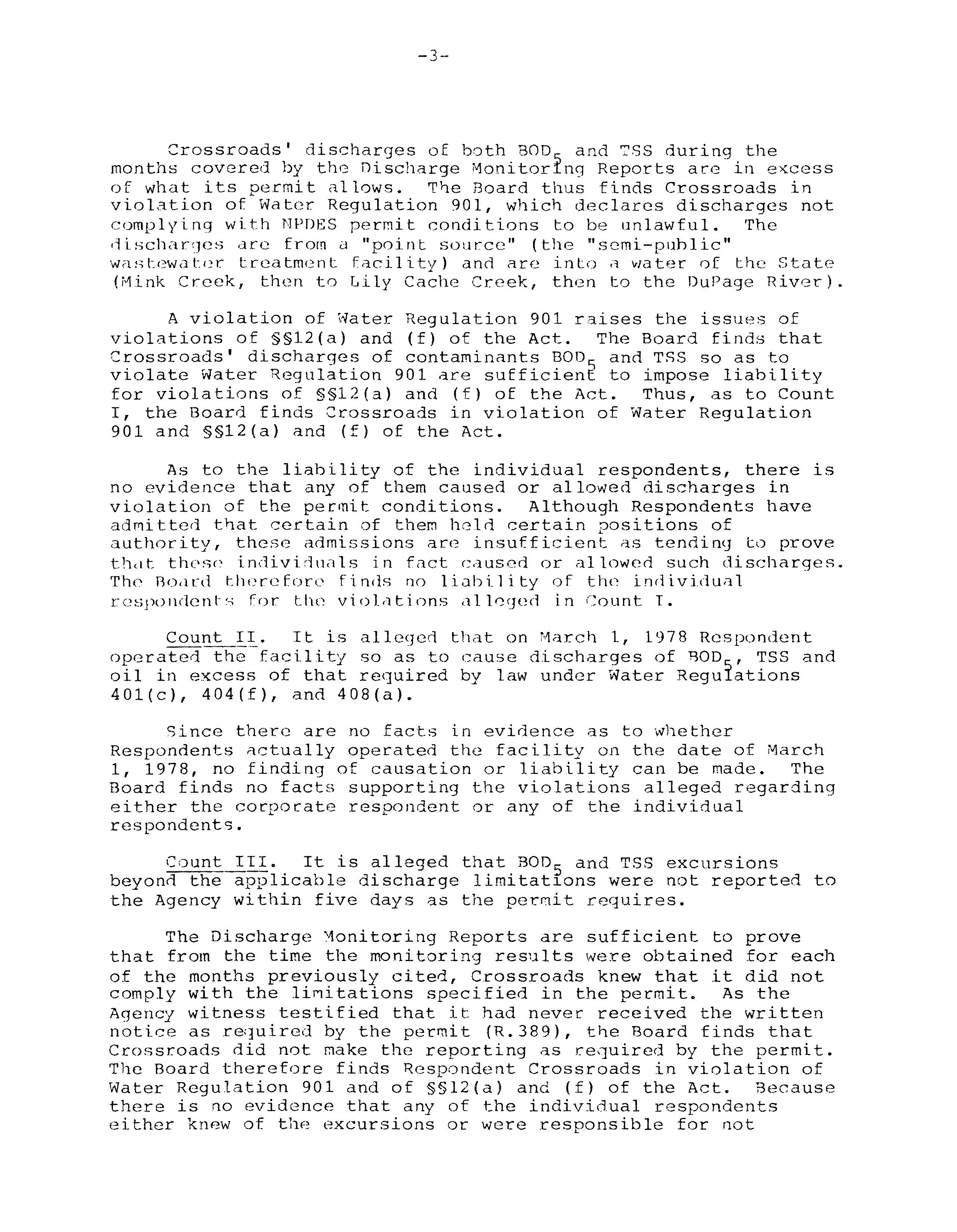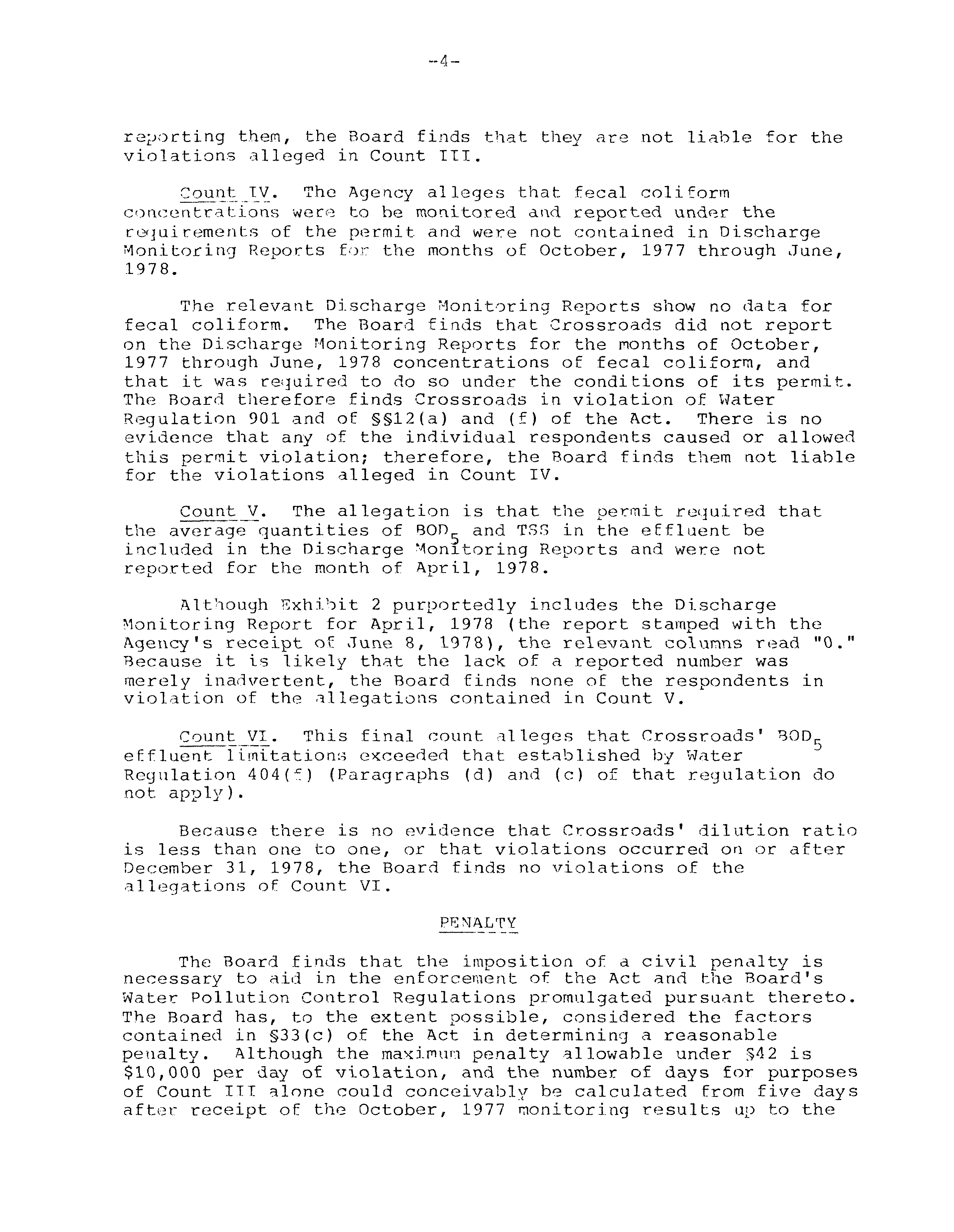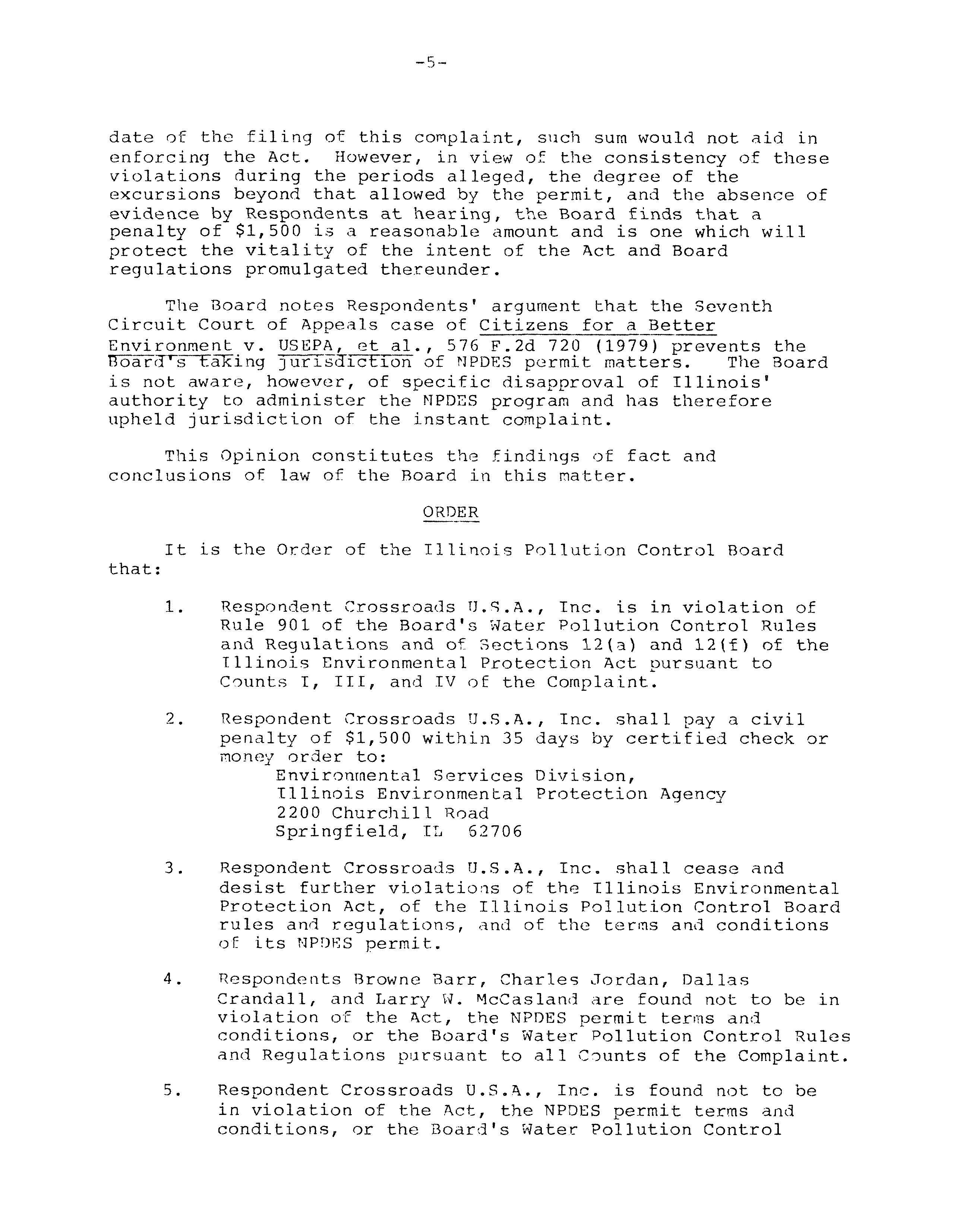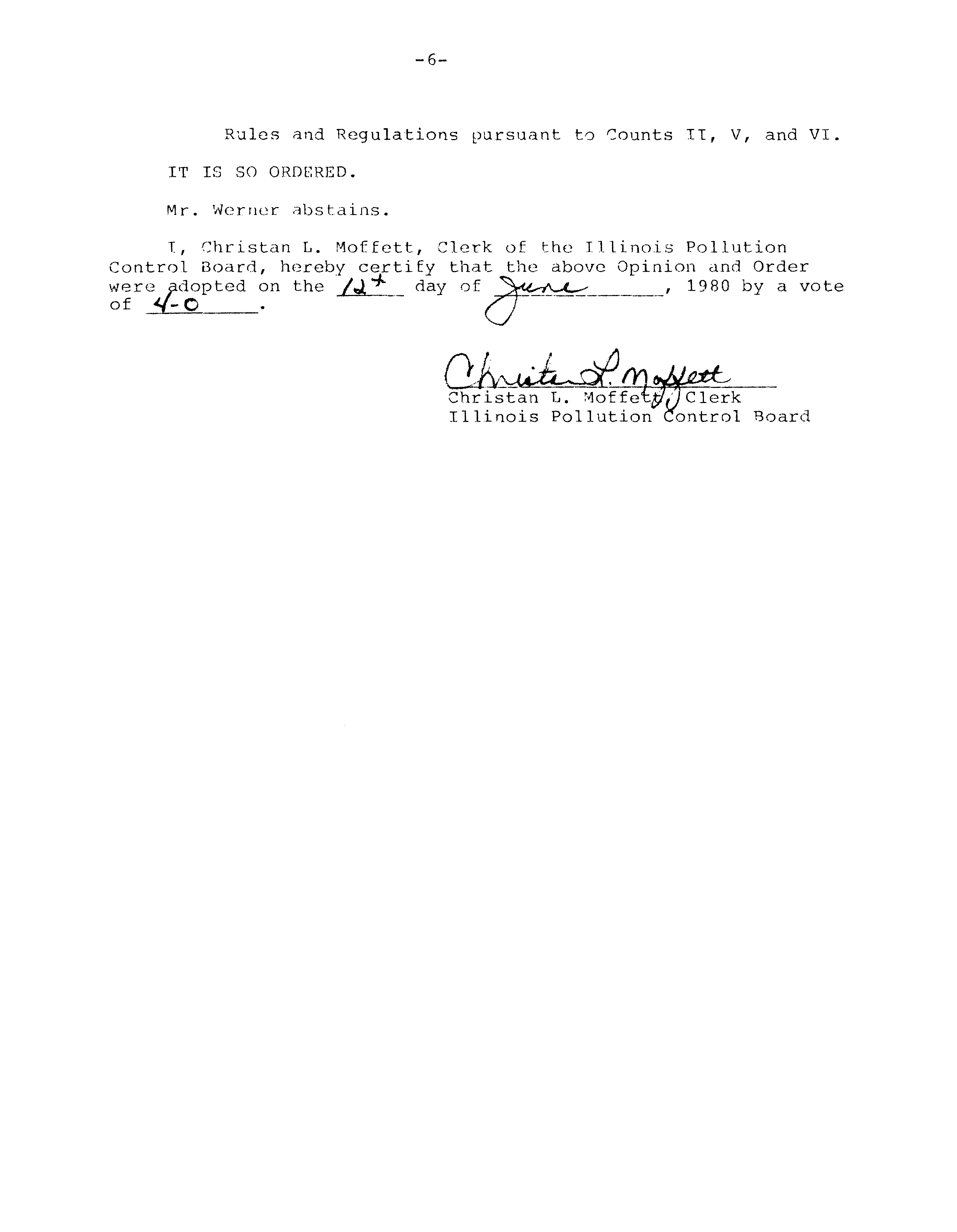ILLINOIS
POLLUTION!
CONTROL
BOARD
June
12,
1980
I ~J~
INO
I
~
~NV
I
RONMENTAL
PROTECT ION
AGENCY,
Complainant,
V.
)
PCB
79—5
CROSSROADS
U.S.A., Inc.,
an Iowa Corporation;
BROWNE BARR; CHARLES JORDAN;
DALLAS
CRANDALL
and
LARRY W.
MC CASLAND,
Respondents.
MR.
WILLIAM
E
BLAKNEY,
ASSISTANT ATTORNEY
GENERAL,
APPEARED
FOR
COMPLAINANT;
MR.
~JOHN
L.
PARKER,
ESQUIRE,
APPEARED
FOR
RESPONDENTS.
OPINION
AND
ORDER
OF
THE
BOARD
(by
I.
Goodman):
This
complaint,
as
amended
February
20,
1979,
alleges
the
operation and/or management of
a “semi—public” wastewater
treatment facility
at Routes
30 and
55
in Plainfield, Will
County,
in violation of the Illinois Environmental Protection Act
(Act) and the Board’s Water Pollution Control Rules and
Regulations
(Water
Regulations).
Hearing
was
held
on February
19,
1980 in Joliet,
at which Respondents presented no evidence.
Both parties submitted post—hearing briefs.
Both parties issued and answered interrogatories and
Respondents answered Complainant Agency’s request
for admissions
of
fact.
None of these discovery vehicles produced facts
material
to the issues of
liability presented by the complaint.
At the hearing, the Agency produced two employee—witnesses.
One testified that no reports
of contaminant excursions had been
received from Respondents during the period October,
1977 through
November,
1978
(R.38-9).
He further stated that Respondent
Crossroads
had. never recorded discharge
levels for the
contaminant fecal coliform
(R.39—40).
The other Agency witness testified
that
on March
1,
1978 he
inspected the facility with Respondent Crandall and sampled the
effluent.
He noted that the facility was not then operating and
that
none of the machinery was working
(R.53—55).
Although
the
witness did not sample the outfall from
the
discharge
(R.67),
he
—2—
did sample the contents of a chlorine contact tank
(R.53).
These samples were sent the next morning to the Agency’s
laboratory, and the results wore received
on
March 17,
1978
(R.59,62—3,66).
No other evidence at hearing was given except for submittal
of the NPDES permit concerned (Ex.1), copies of the Discharge
Monitoring Reports for January, 1978 through January, 1979
(Ex.2), and the laboratory analyses of the samples
(Ex.3).
The
laboratory analyses were admitted by the hearing officer under
Procedural Rule 320(b) when
they
were used solely to refresh the
witness’ recollection as to when the Agency received the results
of the analyses
(R.58—76).
Counsel for Respondents quite
properly objected to the admission of these analyses as Exhibit 3;
the hearing officer’s ruling is overruled.
Counsel
for Respondents moved at the close of the hearing to
dismiss the complaint for failure of proof of a prima facie case
against Respondents (R.76).
The Board hereby answers the motion
as follows.
Count I.
It
is alleged that discharges of both
SOD5
and
Total Suspended Solids exceeded the amounts permitted by the
NPDES permit from October,
1977 through June,
1978 and September,
1978 through November,
1978, and that this constitutes a
violation of the permit, of Water Regulation 901, and of SS12(a)
and
(f) of the Act.
Liability as to all of these depends on whether Respondents
violated the relevant discharge limitations contained in the
NPDES
permit.
Although these limitations are in evidence before
the Board
(4 mg/l
BODç,
5 mg/l TSS, and 200 per 100 milliliter
fecal coliform), the ónly evidence before the Board to compare
with the limitations contained in the permit is that contained in
the Discharge Monitoring Reports (Ex.2).
These reports show
discharge levels as follows:
ROD
(ng/l)
TSS
(mq/l)
October, 1977
h.p
November,
1977
18.0
27.0
December, 1977
15.0
18.0
January,
1978
14.5
18.0
February, 1978
19.0
27.0
March,
1978
42.0
29.0
April,
1978
39.0
42.0
flay,
1978
29.0
32.0
June,
1978
14.0
19.0
September,
1978
18.0
24.0
October,
1978
11.0
22.0
November,
1978
19.0
27.0
None of the reports contained data on concentrations of
fecal coliform.
Crossroads’
discharges of both HOD
and TSS during the
months covered
by
the Discharge Monitor~nq Reports are
in
excess
of
what its permit allows,
The Board
thus
finds Crossroads
in
violation
of Water Regulation
901,
which declares discharges not
complying
with
NPDES
permit conditions
to he unlawful.
The
ii
~schar~jesare from
a “point source”
( the
“semi—public”
wa~t:ewat:ertreatment facility)
and are into
a water
of
the
State
(Mink
Creek,
then
to
Lily
Cache Creek,
then
to the DuPage River).
A
violation
of
Water
Regulation
901
raises
the issues of
violations
of §S12(a) and
(f)
of the Act.
The Board
finds that
Crossroads’
discharges
of contaminants BOD~and TSS
so as
to
violate Water Regulation 901 are sufficienf.
to
impose liability
for violations of §~12(a)and
(f)
of the Act.
Thus,
as
to Count
I,
the Board
finds Crossroads
in violation of Water Regulation
901 and §~12(a)and
(f)
of the Act.
As
to
the
liability of the individual respondents,
there
is
no
evidence
that
any
of
them
caused
or
allowed
discharges
in
violation
of
the
permit
conditions.
Although
Respondents
have
admitted that certain
of
them hold
certain
positions
of
authority,
these
admissions
are
insufficient
as
tending
to
prove
that
these
inclivi’iuals
in
fact caused
or
al
lowed
such
discharges.
rrt~ Board
there
lore
finds
no
I~abi,
ii
ty
of
the
individual
rcspoiiclen
t
For
the
viola tions
al leqed
i n
Count
T
Count
II.
It
is
alleged
that
on
March
1,
1978
Respondent
operated
the
facility
so
as
to
cause
discharges
of
BODç,
TSS
and
oil
in excess of that required by
law under Water Regulations
401(c),
404(f),
and 408(a).
Since
there
are
no
facts
in
evidence
as
to
whether
Respondents
actually
operated
the
facility
on
the
date
of
March
1,
1978,
no finding of
causation
or
liability
can
be
made.
The
Board finds
no facts supporting the violations alleged regarding
either the corporate respondent or any of the individual
respondents.
Count
III,
It
is
alleged
that
HOD5
and
TSS
excursions
beyond the applicable discharge
limitations were not reported to
the Agency within five days
as the permit requires.
The Discharge Monitoring Reports are sufficient
to prove
that from the time the monitoring results were obtained for each
of the months previously cited, Crossroads
knew that it did not
comply with the limitations specified in the permit.
As the
Agency witness testified
that
it had never
received the written
notice
as required by the permit
(R.389), the Board
finds that
Crossroads did not make the reporting
as required by the permit.
The Board therefore finds Respondent Crossroads
in violation of
Water Regulation
901 and of §~l2(a)and
(f)
of the Act.
Because
there is
no evidence that any
of the individual respondents
either knew
of
the
excursions or were responsible for not
--4—.
reporting
them,
the Board finds that
they are not liable for the
violations
alleged in Count III.
Count:
TV.
The
Agency
alleges
that
fecal
coliform
concentratjons were
to he monitored
and
reported under the
requirement:s
of
the
permit
and were not contained
in Discharge
Monitoring Reports
for the months of October,
1977 through June,
1978.
The
relevant
Discharge
Monitoring
Reports
show
no
data
for
fecal
coliform.
The
Board
finds
that
Crossroads
did
not
report
on the Discharge Monitoring Reports for the months of October,
1977 through June,
1978 concentrations
of fecal
coliforrn,
and
that
it
was
required
to
do
so
under
the
conditions
of
its
permit.
The
Board
therefore
finds
Crossroads
in
violation
of
Water
Regulation
901
and
of
§~12(a)
and
(f)
of
the
Act.
There
is
no
evidence that any of the individual respondents caused or allowed
this permit violation;
therefore,
the Board
finds them not liable
for the violations alleged
in Count IV.
Count
V.
The
allegation
is
that
the permit
required
that
the
average
quantities
of
BOD5 and TSS
in the effluent be
included in the Discharge Monitoring Reports and were not
reported for the month of April,
1978.
Although Exhibit
2 purportedly
includes the Discharge
Monitoring
Report
for
April,
1978
(the report stamped with the
Agency’s receipt of June
8,
1978),
the relevant columns read
“0.”
Because it
is likely that the lack of a reported number was
merely inadvertent,
the Board
finds
none
of
the
respondents
in
violation of
the
allegations
contained
in
Count
V.
Count
VT.
This
final
count
alleges
that
Crossroads’
HOD5
effluent limitations e~(ceededthat established by Water
Regulation
404(-f)
(Paragraphs
(d)
and
(c)
of that regulation
do
not apply).
Because there
is no evidence that Crossroads’ dilution ratio
is less than one
to one,
or
that violations occurred on or after
December
31,
1978,
the Board
finds
no violations
of
the
allegations
of Count VI.
PENALTY
The Board finds
that the imposition of
a civil
penalty
is
necessary
to
aid
in
the
enforcement
of
the
Act
and
the Board’s
Water Pollution Control Regulations promulgated pursuant thereto.
The
Board
has,
to
the
extent
possible,
considered
the
factors
contained
in
§33(c)
of
the
Act
in
determining
a
reasonable
penalty.
Although
the
maximur.i
penalty
allowable
under
~42
is
$10,000 per day of violation,
and the number of days
for purposes
of Count
III alone could conceivably he calculated
from five days
after receipt of
the
October,
1977 monitoring results up
to the
-.5...
date
of
the
filing
of
this
complaint,
such
sum
would
not
aid
in
enforcing the Act.
However,
in view
of
the
consistency
of
these
violations
during
the
periods
alleged,
the
degree
of
the
excursions beyond that allowed by the permit,
and the
absence
of
evidence by Respondents at hearing, the Board finds that
a
penalty of $1,500
is a reasonable amount and
is one which will
protect the vitality
of the intent of the Act and Board
regulations promulgated thereunder.
The Board notes Respondents’
argument that
the
Seventh
Circuit Court
of Appeals case of Citizens for
a Better
Environment v.
TJSEPA,
et al.,
576 F.2d
720
(1979) prevents the
Boar~V~~d~ing
juriscT~fTdnof NPDES permit matters.
The Board
is not aware, however,
of specific disapproval
of Illinois’
authority
to administer the
F”JPDES program and has therefore
upheld
jurisdiction
of
the
instant
complaint.
This Opinion constitutes the findings
of fact and
conclusions
of
law
of
the
Board
in
this
matter.
ORDER
It
is
the
Order
of
the
Illinois
Pollution
Control
Board
that:
1.
Respondent Crossroads TJ.S.A.,
Inc.
is
in violation of
Rule
901 of the Board’s Water Pollution Control Rules
and Regulations and of Sections 12(a)
and 12(f)
of the
Illinois
Environmental
Protection
Act
pursuant
to
Counts
I,
III,
and
IV
of
the
Complaint.
2.
Respondent
Crossroads
U.S.A.,
Inc.
shall
pay
a
civil
penalty of $1,500 within 35 days by certified check or
money order
to:
Environmental Services Division,
Illinois Environmental Protection Agency
2200 Churchill Road
Springfield,
IL
62706
3.
Respondent Crossroads U.S.A.,
Inc.
shall cease and
desist
further
violations
of
the
Illinois
Environmental
Protection
Act,
of
the
Illinois
Pollution
Control
Board
rules
and
regulations,
and
of
the
terms
and
conditions
of
i.ts
NPr)ES
permit.
4.
Respondents
Browne
Barr,
Charles
Jordan,
Dallas
Crandall, and Larry W. McCasland are found not
to be
in
violation of the Act,
the NPDES permit
terms and
conditions, or the Board’s Water Pollution Control Rules
and Regulations pursuant
to all Counts of the Complaint.
5.
Respondent Crossroads U.S.A.,
Inc.
is found not
to be
in violation of the Act,
the NPDES permit terms and
conditions, or the Board’s Water Pollution Control
—6—
Rules
and
Regulations
pursuant
to
Counts
TI,
V,
and
VI.
IT
IS
SO
ORDE~RED.
M r
.
Wer
r
I~
r
abs
t: aIns
I,
Christan L.
Moffett, Clerk of
the Illinois Pollution
Control
Board, hereby certify that the above Opinion
and
Order
wer~~pted on the
J~
day ~
1980
by
a
vote
Christan
L. Moffet.~jClerk
Illinois Pollution control Board
